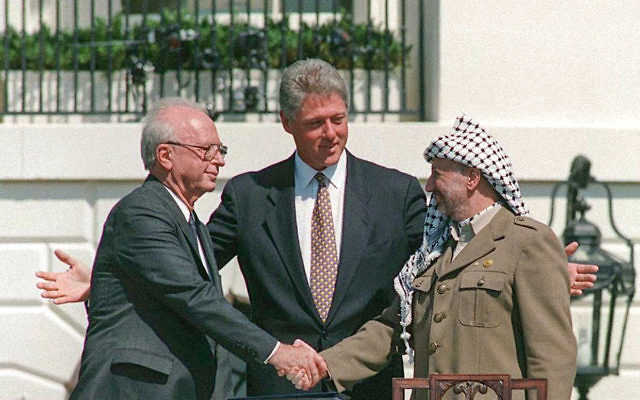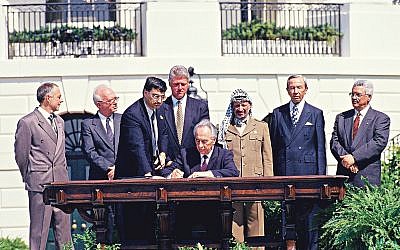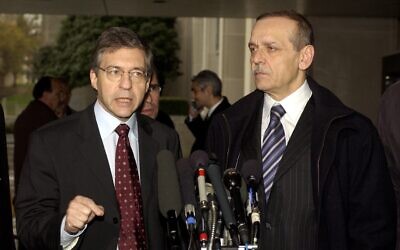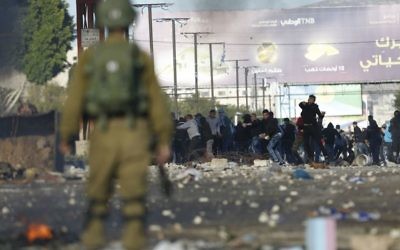Thirty years after Oslo Accords: What went wrong and what now?
Jewish News spoke with Yossi Beilin, Israel's negotiator, and Nasser Al Qudwa, Yasser Arafat's nephew and former foreign minister, on the 30th anniversary of the Oslo Accords.

Thirty years after the Oslo Accords, Israel’s main negotiator, Yossi Beilin, has given Jewish News an exclusive interview about the failed deal’s flaws and decades-long implications.
The accords, signed by Prime Minister Yitzhak Rabin and Palestinian leader Yasser Arafat on September 13 1993, assured mutual recognition by the two parties for the first time ever, along with the establishment of the Palestinian Authority and separation of the West Bank into three Areas; A, B and C, with the Palestinian partially controlling the first two and Israeli controlling the latter.
“People (in the government) were not euphoric. We were all skeptical, including myself. They knew it was a consequential moment. Someone asked me if I’m sleeping at night and I replied ‘No way’,” Beilin said.
Last week, Israel declassified the “Oslo Protocols”, revealing details of a government meeting just two weeks before the accords were signed. In the meeting, where the accords were approved by the Israeli government, Rabin said it was “a difficult deal,” and that some of the wordings in the accords were “unpleasant.”
Rabin also said that the settlement movement “complicated matters” and that it offered no “security benefit” for Israel.” Beilin clearly remembers the meeting, which, despite the many concerns voiced by both Rabin, Foreign Minister Shimon Peres and IDF Chief of Staff Ehud Barak, was “proud of.”
“I asked Ehud Barak how he would vote had he been a minister and not chief of staff. He said he would support it, without a question,” Beilin said.
When asked about flaws of the deal, looking back at it today, Beilin’s answer is clear: “The biggest mistake we made was that we didn’t insist on freezing settlements. Rabin didn’t want to include this in the agreement so he wouldn’t be seen as succumbing to Palestinian demands to stop settlement construction. The Palestinians understood and accepted it. We are paying the price until today.”

Jewish News also spoke to Yasser Arafat’s nephew, Nasser Al Qudwa, who was Palestinian ambassador to UN at the time of the accords and became Palestinian Foreign Affairs Minister in 2005.
Just like the Israelis had their reservations about the deal, so did the Palestinians, Al Qudwa said: “Arafat was was worried about entering the Oslo accords but he was also enthusiastic.”
Al Qudwa agrees with Beilin that failing to freeze the settlement construction was a vital mistake. “It’s the antithesis of reaching peace. That was one of the mistakes. The second was not defining the end result. Where are we heading? Both sides have their own assumptions. The logical end result for us was a state. But it wasn’t in the text.”
Al Qudwa also said that the entire text was “bad and unclear,” and that there were also “too many enemies (of the agreement).”
“Baruch Goldstein (Jewish terrorist who killed 29 Palestinians in Hebron in 1994), then Yigal Amir who killed Rabin, then the campaign of Palestinian suicide bombings, and then finally the reversal of Oslo by right-wing governments in Israel,” Al Qudwa said.

Beilin said he expected backlash over the Oslo Accords, but that he was surprised how severe it was. “That an Israeli doctor in a military uniform, Baruch Goldstein, would kill 29 Palestinian worshippers in Hebron? My imagination was much more modest.”
As for the suicide attacks, launched by Hamas and Islamic Jihad during the Oslo years, Al Qudwa insisted that Arafat confronted them but gave up after reaching the conclusion that the results of Oslo “wouldn’t be pleasant.”
“It was after Rabin was assassinated. It was very decisive. I went to see Arafat after it happened, and we sat together in a room for an hour without him uttering a word. He was really, really upset and sad. I told him I didn’t understand why he was so sad. After all, the guy who takes over now is Shimon Peres, he is more committed to peace,” he said.
“He looked at me with a face that said everything. I interpreted it as him saying “don’t be stupid.” He understood this was a serious turning point. Peres might have had good intentions but he wouldn’t be able to deliver and that would probably lead to Netanyahu rising to power,” Al Qudwa added.
Oslo is over
For Beilin, the Oslo Accords should’ve expired in 1999 and replaced with a permanent agreement, as was stipulated in the agreement.
“There is too much left of the Oslo accords today, it’s over. It shouldn’t exist. The fact that the right-wing in Israel is using it as a permanent agreement without admitting it is a shame. They are keeping it alive artificially. The Palestinian Authority should collapse. We are using, artificially, a structure that was supposed to last five years. It is abnormal,” he said.

“If that doesn’t happen, Israel should once again be responsible for the Palestinians, such as their education, health and whatever they need. We are the occupiers and they are the occupied. And we need to take responsibility for it. Why is the world paying the annual budget for the Palestinians? We should pay for it, like we did until 1995,” Beilin continued.
Al Qudwa is likewise pessimistic about the remains ion the Oslo Accords: “In reality, what we have now has nothing to do with Oslo. The Israeli army is everywhere, the crossing points are handled in a negative way and so on.”
Neither Beilin nor Al Qudwa believe that the current status-quo between the Israelis and Palestinians is sustainable.
“There is a threat of apartheid. A minority of Jews dominating a minority of non jews, eventually, to keep it as a jewish state, it will be something like apartheid by not giving rights to the majority. It is crazy. It is an anti zionist attitude. It was not the vision of Theodor Herzl, David Ben Gurion or Vladimir Jabotinsky. None of them, in their worst nightmares, could envision Israel becoming like that,” Beilin said.
Al Qudwa still believes that there is “only one” solution to the conflict, “which was already concluded at the beginning of the 20th century; Divide the land and respect the right to self determination for both people. Two states.”

“I think many Isarelis reached the same conclusion. Some accept it and some refuse and insist on taking it all, as we see now with the most extreme government. But I’m not that pessimistic. I think we need a serious change of leadership on both sides. The Israeli government will fall, because of Israeli and Jewish considerations, and there is a need for the Palestinian leadership to go. It’s too old, corrupt, and irrelevant,” he said.
For Beilin, the answer is slightly different: “Today, the biggest hurdle would be to evacuate settlements. Even if we change the borders with land swaps, and we keep most settlers in Israel. there will be more than 100,000 settlers east of our border. There should be a confederation, with a structure like the EU, in order to keep the full sovereignty of each state (Israeli and Palestinian. And we must find a solution to allow settlers who wish to remain in the territories, as Israeli citizens with full rights, and vice versa.”

Thank you for helping to make Jewish News the leading source of news and opinion for the UK Jewish community. Today we're asking for your invaluable help to continue putting our community first in everything we do.
For as little as £5 a month you can help sustain the vital work we do in celebrating and standing up for Jewish life in Britain.
Jewish News holds our community together and keeps us connected. Like a synagogue, it’s where people turn to feel part of something bigger. It also proudly shows the rest of Britain the vibrancy and rich culture of modern Jewish life.
You can make a quick and easy one-off or monthly contribution of £5, £10, £20 or any other sum you’re comfortable with.
100% of your donation will help us continue celebrating our community, in all its dynamic diversity...
Engaging
Being a community platform means so much more than producing a newspaper and website. One of our proudest roles is media partnering with our invaluable charities to amplify the outstanding work they do to help us all.
Celebrating
There’s no shortage of oys in the world but Jewish News takes every opportunity to celebrate the joys too, through projects like Night of Heroes, 40 Under 40 and other compelling countdowns that make the community kvell with pride.
Pioneering
In the first collaboration between media outlets from different faiths, Jewish News worked with British Muslim TV and Church Times to produce a list of young activists leading the way on interfaith understanding.
Campaigning
Royal Mail issued a stamp honouring Holocaust hero Sir Nicholas Winton after a Jewish News campaign attracted more than 100,000 backers. Jewish Newsalso produces special editions of the paper highlighting pressing issues including mental health and Holocaust remembrance.
Easy access
In an age when news is readily accessible, Jewish News provides high-quality content free online and offline, removing any financial barriers to connecting people.
Voice of our community to wider society
The Jewish News team regularly appears on TV, radio and on the pages of the national press to comment on stories about the Jewish community. Easy access to the paper on the streets of London also means Jewish News provides an invaluable window into the community for the country at large.
We hope you agree all this is worth preserving.





















